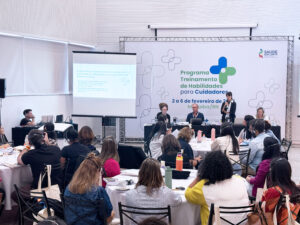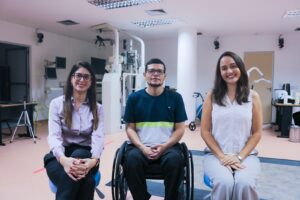The Specialized Maternal and Child Care Service (SAE MI) for people living with HIV/AIDS, installed at the Anita Garibaldi Health Education and Research Center (Anita), one of the units of the Santos Dumont Institute (ISD), in Macaíba, was presented on the morning of Thursday, December 9, to representatives of the Rio Grande do Norte State Department of Public Health (Sesap/RN). Anita is a reference in the reception, treatment and dispensing of antiretroviral medications to pregnant women and children living with HIV/AIDS in Rio Grande do Norte.
Anita's manager, Professor Lilian Lira Lisboa, accompanied by multidisciplinary preceptors, psychologist Carla Glenda Souza da Silva, and social worker Alexandra Lima, detailed the functioning of SAE MI Anita Garibaldi. The Service's team is composed of infectious disease specialists, social workers, gynecologists and obstetricians, nurses, pediatricians, a psychologist and a pharmacist/biochemist.
“It is important to publicize the service provided at Anita Garibaldi to strengthen actions and coordination with other services at the state level. And also to align the flow of care for the key population, which are women and children living with HIV/AIDS,” says Alexandra Lima, multidisciplinary preceptor and social worker at ISD. At the Institute, the Social Service Sector is responsible for coordination with the Municipal Health Departments, monitoring patients in their demands regarding access to medications, transportation, rights and benefits related to living with HIV/AIDS.
Cínthia Carla Teixeira, a technician at the VII Regional Health Department of SESAP, and Camila Revoredo, an accountant at the VII Regional Health Department of SESAP, learned about the processes adopted by SAE MI Anita regarding pregnant women and babies living with HIV or AIDS, children exposed to the virus, and tests to monitor viral load and immune cells. Today, 21 pregnant women with HIV and children exposed to the virus or living with AIDS are being monitored at the Specialized Maternal and Child Care Service at Anita.
“We are getting to know all the services of this type in the VII Health Region. We want to know what is offered and what the difficulties are. Since Anita is a reference SAE specifically for mothers and children, we came to get to know it. Anita Garibaldi, as a whole, is a reference for others in terms of management model and humanized care. As a Health Region, we will try to establish broader coordination in relation to courses for health professionals in the municipalities, for example”, emphasizes Cínthia Carla Teixeira.
The accountant of the VII Health Region, Camila Teixeira, highlights the importance of the need to raise awareness among health professionals so that they become aware of Anita Garibaldi's services and start using them as reference points for the Unified Health System (SUS) network.
In addition to the flows, the challenges of SAE MI Anita were presented to representatives of the state health department. Among them are: expanding safe access to childbirth; implementing PREP (Pre-Exposure Prophylaxis) at SAE MI Anita Garibaldi; implementing the outpatient clinic for light reproductive technologies for couples with HIV/AIDS serodiscordance; implementing HIV self-testing and encouraging Primary Care for the early detection of pregnant women with HIV/AIDS.
Data
Between 2010 and 2020, cases of HIV infection in Rio Grande do Norte grew by 93.1%, rising from 3,190 to 6,158 in the decade analyzed. In the state, Sesap details an increase in case records in all age groups, in both sexes, as well as among pregnant women and in the occurrence of deaths due to the infection. On December 1st, actions around the world were dedicated to World AIDS Day, a disease that has killed approximately 33 million people since its discovery in the early 1980s.
The Anita Garibaldi Health Education and Research Center (Anita), one of the ISD units, is a state reference for the Unified Health System (SUS) for care for pregnant women infected by the virus. From 2018 to 2020, the number of HIV-infected women undergoing prenatal care at Anita increased by 45,45% – rising from 11 to 16. From January to September this year, 12 patients in this condition had started multidisciplinary treatment, with a team composed of by an infectious disease specialist, gynecologist and obstetrician, psychologist, nurse, social worker and biochemical pharmacist.
“All pregnant women who enter Anita, at some point, will take a rapid test for HIV, syphilis and viral hepatitis. The Ministry of Health's protocol defines that tests are carried out in the first trimester of pregnancy, at the beginning of prenatal care and another in the third trimester of pregnancy. At the time of delivery, the mother is tested again for HIV and syphilis. Data from the current Sesap Bulletin points to a reflection of the increase in the number of cases among this population. Screening during pregnancy is very efficient”, points out Carla Glenda Souza da Silva, multi-professional psychologist preceptor at ISD. She highlights, however, that in addition to cases of HIV infection, there is a prevalence of syphilis among pregnant women, which can result in irreversible consequences for the baby, such as serious neurological diseases, if not treated in a timely and skillful manner.
Text: Ricardo Araújo / Ascom – ISD
Photograph: Ricardo Araújo / Ascom – ISD
Communication Office
comunicacao@isd.org.br
(84) 99416-1880
Santos Dumont Institute (ISD)
It is a Social Organization linked to the Ministry of Education (MEC) and includes the Edmond and Lily Safra International Institute of Neurosciences and the Anita Garibaldi Health Education and Research Center, both in Macaíba. ISD's mission is to promote education for life, forming citizens through integrated teaching, research and extension actions, in addition to contributing to a fairer and more humane transformation of Brazilian social reality.













